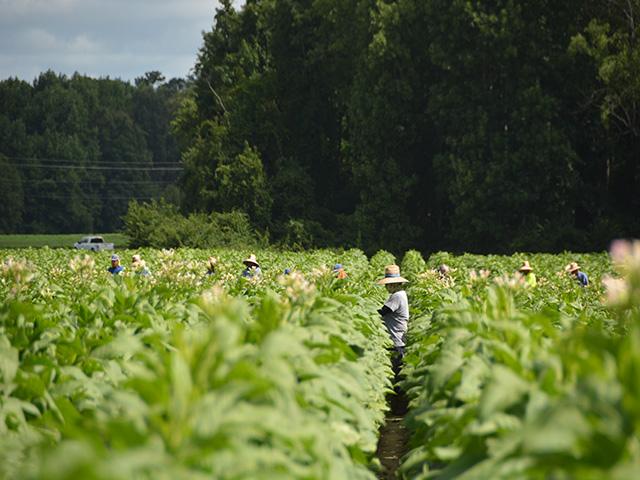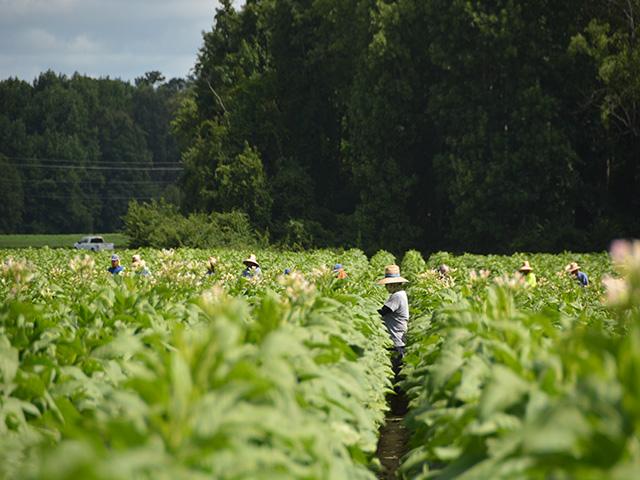Ag Policy Blog
Labor Officials Issue New Rules for Employing H-2A Farmworkers
The 21,000 or so farms that employ H-2A guest workers will face more requirements under a new federal rule.
The U.S. Department of Labor on Friday issued a new rule for foreign guest workers on farms that could make it easier for them to organize labor events and allow workers to decline "captive audience" meetings in which employers discourage workers from joining unions.
The Labor Department said the rule "targets vulnerability and abuses experienced by workers under the H-2A program that undermine fair labor standards for all farmworkers in the U.S. "
Under the H-2A program, farms hire temporary foreign workers when the Labor Department conclude there is a lack of qualified U.S. workers for area farms. Wages also are set to ensure the guest workers do not adversely affect the wages of U.S. workers doing similar work.
"H-2A workers too frequently face abusive working conditions that undercut all farmworkers in the U.S.," said Acting DOL Secretary Julie Su. "This rule ensures farmworkers employed through the H-2A program are treated fairly, have a voice in their workplace and are able to perform their work safely. It also promotes employer accountability, benefitting all farmworkers by upholding labor standards."
Su was visiting northern California on Friday to talk more about the impact of the new rule.
With demand growing, H-2A workers now account for nearly 380,000 farmworkers jobs throughout the year at more than 21,000 farms, according to FY 2023 numbers from DOL.
P[L1] D[0x0] M[300x250] OOP[F] ADUNIT[] T[]
Under the rule, guest workers will have the choice to talk about labor organizing activities while opting out of "captive audience" meetings in which employers discourage workers from joining unions or engage in other protected activities.
Workers also will be allowed to host legal-aid providers or other service providers in housing that is furnished by employers as well.
The rule also clarifies when a farm guest worker can be fired "for cause." The final rule clarifies that an employer only terminates a worker for cause when the worker either fails to comply with employer policies or fails to perform job duties satisfactorily after, in most cases, the transparent application of a system of progressive discipline. The rule establishes that for a worker to be terminated for cause, five conditions must be met, including a requirement that workers are either informed about or reasonably should have known the policy, rule or performance expectation unless the worker has engaged in egregious misconduct.
To prevent both labor exploitation and human trafficking, the final rule clarifies that employers are prohibited from holding or confiscating a worker's passport, visa or other identification documents, which is a tactic used to exploit workers.
The final rule also updates procedures for discontinuing employment services for employers that have failed to meet the Department of Labor's requirements. Relatedly, the rule requires states to also discontinue services to debarred employers. In addition, the rule codifies how the department determines whether separate entities are acting as one employer for purposes of assessing seasonal or temporary need and how these entities are treated for enforcement purposes.
The rule also seeks to make foreign labor recruitment more transparent. Employers will be required to new disclosures to improve foreign worker recruitment chain transparency and provide more information about the nature of the job opportunity, "and bolsters the department's ability to protect workers from exploitation and abuse."
The new provisions require employers to provide a copy of all agreements with any agent or recruiter they engage or plan to engage, disclose the name and location of any person or entity working for the recruiter who will solicit prospective H-2A workers and disclose in the H-2A application the name, location and contact information of the workplace's owners, operators and managers.
Also, the DOL stated it would return to the practice of effectively updating the adverse effect wage rates on the date those new wages are published in the Federal Register. The rule would also require employers who fail to provide adequate notice to workers of a delay in their start date to pay workers the applicable rate for each day that work is delayed for up to 14 days.
For workers who travel in vans or buses, the final rule includes a seat belt requirement to reduce the hazards associated with the transportation of farmworkers. If a vehicle is required by Department of Transportation regulations to be manufactured with seat belts, the final rule prohibits the operation of these vehicles to transport workers under the H-2A program unless each occupant is wearing a seat belt.
The final rule is effective on June 28, 2024. However, H-2A applications filed before Aug. 28, 2024, will be processed according to applicable federal regulations as is in effect as of June 27, 2024. Applications submitted on or after Aug. 29, 2024, will be processed in accordance with the provisions of the Farmworker Protection Rule, DOL stated.
The rule will be published Monday in the Federal Register https://www.federalregister.gov/…
Chris Clayton can be reached at Chris.Clayton@dtn.com
Follow him on social platform X @ChrisClaytonDTN
(c) Copyright 2024 DTN, LLC. All rights reserved.






Comments
To comment, please Log In or Join our Community .